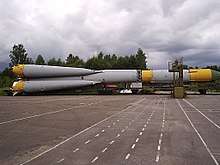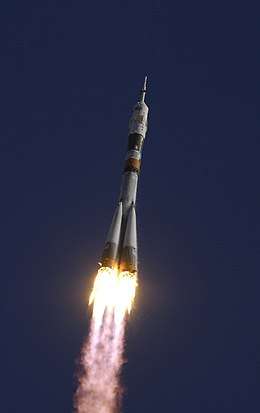Molniya (rocket)
The Molniya (Russian: Молния, meaning "lightning"), GRAU Index 8K78, was a modification of the well-known R-7 Semyorka rocket and had four stages.[1]
 Molniya-M carrier rocket | |
| Function | Medium carrier rocket |
|---|---|
| Manufacturer | Energia |
| Country of origin | Soviet Union |
| Size | |
| Height | 43.44 m (142.5 ft) |
| Diameter | 10.3 m (33.8 ft) |
| Mass | 305,000 kg (672,000 lb) |
| Stages | 4 |
| Associated rockets | |
| Family | R-7 |
| Launch history | |
| Status | Retired |
| Launch sites | Baikonur, Plesetsk |
The 8K78 resulted from a crash program by the Korolev Bureau to develop a booster for launching planetary probes. A larger third stage was added along with a fourth stage (Blok L) that was designed to fire in-orbit to send the payload out of LEO. The basic R-7 core was also structurally strengthened and given more powerful engines. A rushed development produced multiple malfunctions of the upper stages, which led to its being replaced by the improved Molniya-M in 1964, but there were enough 8K78s left to continue flying them into 1967. [2][3][4][5]
Molniya (E6) was a minor revision adapted for launch of some Luna series space probes.
Characteristics
- Length: 43.440 m
- Diameter: 10.300 m
- Launch mass: 305,000 kg
See also
- Soyuz launch vehicle
- Voskhod rocket
- Venera 4V-2
References
- Harvey, Brian (2007-07-05). Russian Planetary Exploration: History, Development, Legacy and Prospects. p. 73. ISBN 978-0-387-46343-8.
- Encyclopedia Astronautica Molniya-1 Archived 16 May 2008 at the Wayback Machine
- Encyclopedia Astronautica Molniya 8K78M Archived 8 May 2012 at the Wayback Machine
- Encyclopedia Astronautica Molniya-2 Archived 2 June 2012 at the Wayback Machine
- The Soyuz Launch Vehicle: The Two Lives of an Engineering Triumph By Christian Lardier, Stefan Barensky, page 156
"Molniya-M Carrier Rocket". РКЦ Прогресс. Retrieved 7 October 2014.
| Wikimedia Commons has media related to Molniya (rocket). |
